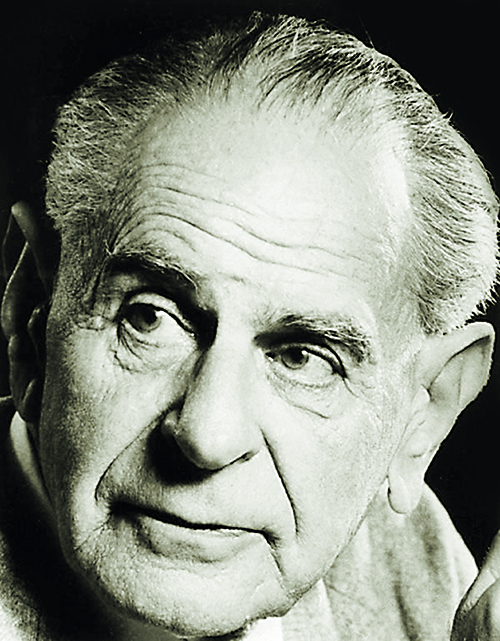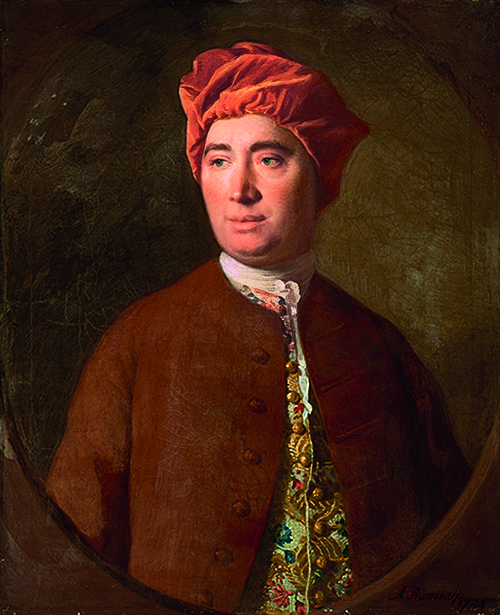Why there is no scientific method
And why it is not a problem

This article briefly reviews and criticizes various strategies that have been proposed by philosophers of science in order to establish a distinction between science and non-science. It also proposes a more modest, but easier, way to make such a distinction. Throughout this text I will first address the problems of the demarcation criteria of the philosophy of science during the first half of the twentieth century; then, I will defend that they absolutely do not justify the radical conclusions reached during the second half of the century.
Keywords: epistemology, demarcation line, defense of common sense.
The complete title of this article should be «Why there is no specific scientific method beyond what is implied by common sense and why it is not a problem». This is in the same spirit as Susan Haack’s statement: «There is no reason to think that [science] is in possession of a special method of enquiry unavailable to historians or detectives or the rest of us» (Haack, 1993). Or as Einstein stated: «The whole of science is nothing more than a refinement of everyday thinking» (Einstein, 1936).
Needless to say, this applies to the «methods» of science or to the reasons for trusting science, not to its conclusions, which are often extremely counter-intuitive from the point of view of common sense (the existence of atoms, the relativity of time, the evolution of species, etc.).
«The notion of verification is not so clear: how do we verify statements about the past or about distant objects like planets or stars?»
Philosophy of science in the 20th century can be, very roughly, divided into two parts: the first half, characterized by logical positivism or by Popper, tried to delineate a distinction between science and non science, whether it be metaphysics or theology or pseudo-science. The second half, under the influence of Quine, then later of Kuhn, Feyerabend and the modern sociology of scientific knowledge, has put into question the various criteria offered during the first half and, in the more radical versions, has tended to conclude that there is nothing specific to science; it is just one discourse, or one social construction among others. In this essay, I will first discuss what was wrong with the various demarcation criteria of the philosophy of science in the first half of the 20th century; then, I will argue that this does absolutely not warrant the radical conclusions sometimes reached during the second half.
Can epistemology save us?
One way to make a science/non-science distinction is to introduce the idea that certain sentences are meaningless, for example because they cannot be «verified», and this was one of the strategies of the logical positivists. A well known problem with that approach is that the sentences expressing this distinction cannot themselves be verified, yet they were not meaningless for those who enunciated them. But, more generally, it is intuitively clear that the fact that a sentence has a meaning for someone is not reduced to the means that that person has to verify it. This is partly because the notion of meaning is itself quite complicated, but also because the notion of verification is not sufficiently clear: how do we verify statements about the past or about distant objects like planets or stars? Of course, we have evidence for what happened in the past or for the properties of objects that are far away, but that evidence is indirect and it is not clear that it can be characterized as a «verification» of certain statements.
Another strategy would be to base science on «facts», combined with a sort of inductive logic. But, as Einstein, among others, has emphasized scientific concepts are «free creations of the human mind»; there is no way to induce, say, the theory of relativity or quantum mechanics from observations that pre-existed to the invention of those theories. Again, there is of course a lot of evidence supporting those theories, but there is no way to (re)construct the theories starting from that evidence.

For Karl R. Popper (in the picture), the answers to scientific problems can only be provisional, as they are always subjected to refutation. / Library of the London School of Economics
Popper of course realized the shortcomings of the inductive approach, but his solution encounters problems too. For Popper (2002), we should invent theories (without following any fixed rules), deduce observable consequences of them, and compare them with observations. If the observations do not coincide with the predictions, then the theory is falsified, so we should reject it and try again.
One problem with Popper’s approach is that it is not clear what one learns if the observations coincide with the predictions. Popper was radically hostile to any inductive reasoning, or to the idea that a theory can be confirmed. But obviously, if scientists have a theory that a certain sickness is caused by a virus, that a certain vaccine can protect us from that virus, and if they observe that administering the vaccine does prevent the sickness, they will say that their theory has been confirmed. Any epistemology that makes that sort of conclusion illegitimate is in serious trouble, and Popper has repeatedly rejected the idea that theories can be confirmed by observations (Sokal and Bricmont, 1999; see chapter 4 for a more detailed discussion of Popper).
But even putting that problem aside, it is not at all clear what falsification of a theory means. Let us consider for example the orbit of the planet Mercury. Astronomers observed in the middle of the 19th century that the orbit of that planet was slightly different than the one predicted by Newton’s laws: there was a slow rotation of its perihelion (i.e. the point of the orbit closest to the Sun) of approximately 43 second of arc per century (which is very small, a circle being divided in 360 degrees and each degree having 3,600 seconds). Why did that observation not count as a falsification of Newton’s theory of gravitation? Rather than reject that theory, people tried to find ad hoc explanations for that anomaly, for example, by postulating that the effect was due to a yet undetected planet (after all that was the explanation for the anomalous behavior of Uranus, that led to the discovery of Neptune).
«What is rational
in science depends very much on the context»
All these efforts failed and the anomaly was finally explained in 1915, as a consequence of Einstein’s general theory of relativity. This was considered a great success of that theory, and the anomaly of Mercury’s perihelion then counted as a partial refutation of Newton’s theory, but only because of the existence of an alternative theory (Roseveare, 1982).
But, from a strictly Popperian point of view, the idea of putting aside some disagreement between predictions and observations should be considered as an illegitimate way to escape refutation. On the other hand, given the enormous successes of Newton’s theory and the fact that the anomaly of Mercury’s orbit could in principle be due to all kinds of causes that would not put into question the general scheme of Newtonian mechanics, it was rational to do what scientists did in the 19th century.
This example illustrates a more general observation: what is rational in science depends very much on the context. But that implies that it is hardly possible to give general rules, independent of the context, that would either constitute «the scientific method» or provide a sharp distinction between science and non science.
A moment’s reflection shows that the problem already occurs in everyday’s life. Some thoughts about our environment are more rational than others, but it is impossible to characterize that rationality by simple context-independent rules. And if it is impossible to do that for the rationality of everyday life, why should we expect to be able to do that for what is rational or not in science?
This is the basic difficulty met by the epistemologists of the first half of the 20th century. Of course, this was pointed out in various ways by those of the second half. For example, Quine argued that facts always underdetermine theories (Quine, 1980); Kuhn showed that theory choice was not always grounded in rational arguments (Kuhn, 1970); Feyerabend wrote Against method (1975) to emphasize the non-existence of a fixed scientific method. It would take too long to discuss the excesses to which some of these ideas led, but, interpreted in a moderate way, they are not only true but banal. By «moderate» I mean that they were right to observe that previous efforts trying to characterize the scientific enterprise through a fixed set of rules failed.

Philosophy during the second half of the twentieth century, under the influence of Quine, then later of Kuhn, Feyerabend and the modern sociology of scientific knowledge, has put into question the various criteria offered during the first half and, in the more radical versions, has tended to conclude that there is nothing specific to science. In the picture, Paul K. Feyerabend, author of Against Method (1975). / Grazia Borrini-Feyerabend
However, what does all that imply for science and its credibility? The epistemologists who criticized the logical positivists or Popper were criticizing other epistemologists, but not the scientists themselves. There is nothing in the writings of Kuhn or Feyerabend showing that Darwin or Einstein were actually wrong. On the other hand, apart from occasional reflections on science, scientists do not try to prove that what they do is scientific according to some philosophical definition of science, but they rather try to show that what they say is true.
The problem is that, for people outside of science, or for scientists outside of their speciality, it is difficult to appreciate whether what scientists say is true, and also who are the real scientists, versus the false ones. Is evolution true? What about psychoanalysis? What about anthropogenic global warming? Without some idea of what characterizes a science, it is impossible for the non expert to make up his mind. That is why the epistemologies of the second half of the 20th century have had such a deleterious effect on the credibility of science: if there is no conceptual distinction whatsoever between science and non science, then the non expert has either to trust scientists blindly or to fall into a generalized skepticism. In the next section, I will try to offer a way out of this dilemma.
Generalizing Hume’s argument against the belief in miracles
Hume’s argument (2014) against the belief in miracles is well known: suppose that, as most people, you have never witnessed a miracle yourself, but that you have heard reports of miracles happening, for example, in the Bible or in other «sacred» texts. Is it rational to believe those reports? No, because you know, from your own experience, that people may deceive you or deceive themselves. Therefore, it is always more rational to think, when one hears a report of a miracle, that someone is deceiving you or deceiving himself than to believe that a miracle, for which you have no direct experience, really happened.
«There is nothing in the writings of Kuhn or Feyerabend showing that Darwin or Einstein were actually wrong»
This is the basic commonsensical argument to which the statement «there is no specific scientific method beyond what is implied by common sense» refers to. Of course, commonsensical here does not mean (unfortunately) that this argument is widely shared, since many people believed in miracles in Hume’s time and in all kinds of superstition nowadays. But it means that we do not need a special knowledge or a deep philosophical reflection to grasp it.
That argument can be used quite generally: we must ask the same question to the used car dealer, to the banker that promises a great return on investment, to the politician who says that the end of the crisis is around the corner, to the journalist reporting events in distant lands, as well as to the priest, the psychoanalyst and the physicist: what reasons do you give me to believe what you say rather than to believe that you deceive me or deceive yourself? Let’s call this the skeptical argument.
We will now briefly discuss how different people, such as scientists, pseudo-scientists and theologians, can answer this argument, starting with the scientists. The first answer is given by technology: if one could transport cars, airplanes or medicine back in time to the 18th century, they would certainly appear to be miracles. But, unlike those of the Bible, they would be directly visible by everybody.
A second argument, which is however less obvious to most people, has to do with the coincidence between predictions and observations. To be able to predict results of future experiments with high precision would again appear to be a miracle to people who do not know modern science. Here, one uses, like Popper, the coincidence between predictions and observations as an argument in favor of the specificity of science, but not with the same logic: we take this coincidence as surprising and therefore as evidence that scientists know (at least to some extent) what they are talking about, and not merely as evidence that their theory has not yet been falsified. Our way to proceed does not reject induction as Popper does (Stove, 1982).
«It is only by assuming that science is approximately true that we can explain its successes without considering them miraculous: this is sometimes called the “no miracle argument”»
These arguments do not prove that all the claims made by scientists are to be believed, and they leave aside important questions of philosophy of science, such as the status of theoretical entities like forces or fields, but they do show that scientists do not systematically deceive us or deceive themselves.
Turning to pseudo-sciences, such as homeopathy, astrology or psychoanalysis, none of the above arguments is available. There are no systematic cures or theoretical predictions that are empirically verified and that are based on those doctrines. Of course, this has to be shown (and we do not have the space to do it here), by examining claims that the pseudo-scientists make about the empirical successes of their theories and by refuting them. There is no a priori way, based on some philosophical «demarcation line» between science and pseudo-science, to avoid doing that job. After all, if the pseudo-sciences «were» making successful predictions or were curing diseases systematically, then they would be sciences, because they would then answer the skeptical argument outlined above, just as the sciences do.
Sometimes one hears from defenders of psychoanalysis the claim that their discipline depends on «another methodology» than the one of the natural sciences, because it deals with human beings. Of course, every science has specific ways to test its claims: repeating experiments, using controls, testing new drugs in double blind experiments, etc. But, if one thinks about it, these are just specific ways to answer the skeptical argument. Relying on non-publicly available observations or «experiences», such as listening to someone on a couch, does not provide such an answer, precisely because the «data» here are in general not publicly available and are simply reported and interpreted by the analyst (Grunbaum, 1984). Some people argue that ordinary scientific methods cannot be applied to humans; but if there is nothing really specific about the scientific method apart from answering the skeptical argument and if, for some reason, the peculiarities of some aspects of human affairs prevents us from answering that argument, then we should conclude that we cannot obtain reliable knowledge of those aspects of human affairs, and not that we can obtain such a knowledge by adopting «another methodology».
Finally, for theologians or religious people in general, one has to distinguish two kinds of claims: the more widespread and popular ones concern miracles, prophecies and the fulfillment of prayers. This covers the vast majority of religious beliefs. All those claims have the same status as those of the pseudo-sciences, they can be checked, and, as far as I know, checking those claims produces negative results, just like for the pseudo-sciences. But again, such checking is essential: if miracles did occur, or if prayers were fulfilled in some systematic way, then of course that would be evidence for some of the claims of the religions.

In his book An Enquiry Concerning Human Understanding, published in 1748, the philosopher David Hume argued against believing in miracles because they denied natural laws. In the picture, portrait of David Hume by Allan Ramsay. / Scottish National Portrait Gallery, Edimburgh
There is another class of statements made by religious people, which are favored by theologians and philosophers, and that concern the creator of the universe, or the reason why there is something rather than nothing, or the god of the anthropic principle, or the one of intelligent design, etc. This is what one might call the «metaphysical god». It is always a «god of the gaps», in the sense that it is supposed to provide answers or explanations that science does not provide. Of course, that god does not perform miracles or answer our prayers (at least, none of the arguments advanced in favor of its existence suggest that he does). In that sense, its existence cannot be empirically refuted. But what is more important is that it cannot be characterized in any specific way. Just because there is supposed to be some Being «explaining» what we do not know does not mean that this Being likes us, cares about us, is good or bad or almighty. In short, it has nothing to do with the various gods that actual existing religious people worship and from whom they expect some reward, usually in this life or at least in the afterlife. It is only an abuse of language that allows theologians to speak of the metaphysical god as if it coincided with the one of the gods in which their credulous followers believe.
Conclusions
The naïve or commonsensical view is that science is true, or approximately true, because it is successful, where the latter expression refers to science giving rise to modern technology or to precise predictions. This is sometimes called the «no miracle argument»: it is only by assuming that science is approximately true that we can explain its successes without considering them miraculous. This is not different from saying that if there is a leak in the bathroom, a plumber comes and the leak disappears, then the plumber has probably done something to fix it. Of course, there is no logical proof that the plumber fixed the leak; maybe the leak disappeared by accident or by a miracle. But that is not what common sense leads us to believe and the same holds for the successes of science.
This argument has been often criticized by philosophers and some of them have tried to find supposedly more rigorous criteria to distinguish science from non science, either by devising an inductive logic or by introducing the notion of falsification.
However, it is fair to say that these alternatives have failed. For those who have taken the debates in philosophy of science as being essential for our trust in the scientific enterprise, these failures have led to a surge of radical skepticism and cultural relativism. But luckily, the commonsensical argument still holds and that is all that we really need.
Einstein, A., 1936. «Physics and Reality». In Einstein, A., 1954. Ideas and Opinions of Albert Einstein. Crown publishers. New York.
Feyerabend, P., 1975. Against Method. New Left Books. London.
Grunbaum, A., 1984. The Foundations of Psychoanalysis; A Philosophical Critique. University of California Press. Berkeley.
Haack, S., 1993. Evidence and Inquiry. Towards Reconstruction in Epistemology. Blackwell. Oxford.
Hume, D., 2014 [1748]. An Enquiry Concerning Human Understanding. Barnes & Noble. New York.
Kuhn, T., 1970. The Structure of Scientific Revolution, 2nd ed. University of Chicago Press. Chicago.
Popper, K. R., 2002 [1935]. The Logic of Scientific Discovery. Routledge. New York.
Quine, W. V. O., 1980 [1953]. «Two Dogmas of Empiricism». In Quine, W. V. O. From a Logical Point of View. 2nd ed., revised. Harvard University Press. Cambridge.
Roseveare, N. T., 1982. Mercury’s Perihelion from Le Verrier to Einstein. Clarendon Press. Oxford.
Sokal, A. and J. Bricmont, 1999. Fashionable Nonsense. Postmodern Intellectuals’ Abuse of Science. St Martin’s Press. New York.
Stove, D. C., 1982. Popper and After: Four Modern Irrationalists. Pergamon Press. Oxford.





